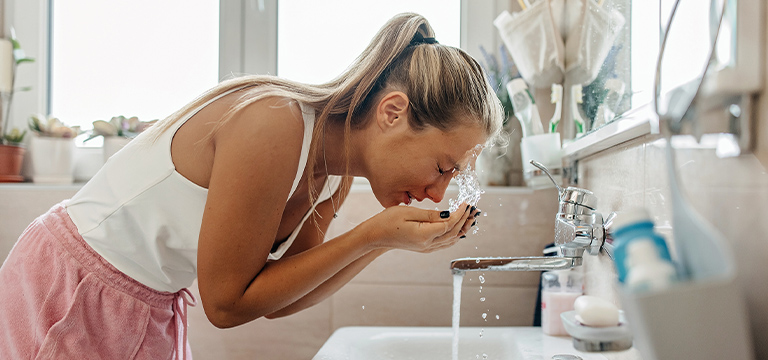Your eye is designed to avoid things from getting in it. Your eyelids, eyelashes and tears all help keep debris and irritants from impacting your vision. Think about all the airborne particles you encounter in your daily life, from household dust to springtime pollen.
Usually, your eye’s natural defenses do a good job of keeping these things out of your eye. But, every now and then, irritants can get stuck in your eye—sometimes painfully. It’s important to clean out your eye following the right procedures to avoid damaging your eye and protecting your vision.
How you clean your eye depends on what’s caught in it. As a general rule, never touch your eyes without properly washing your hands first.
Here are some directions you should follow when you’re in need.
Small debris
Your tears are a helpful defense here. If there aren’t enough tears getting rid of the debris, you can cause your eye to tear up more by pulling your upper eyelid down so it hangs over your lower lashes. You can also flush out your eye with cool water from a sink for as long as necessary if tears aren’t cutting it.
If the debris is visible on your eye, wiping it may work too. Use a soft, wet washcloth to gently swipe at the object. Be sure not to poke your eye or rub hard, which could move the object deeper into your eye.
Mucus or pus
Your eye can produce mucus or pus when you’re down with a cold, allergies or have pinkeye. This can also be caused by a more serious complication, like a blocked tear duct or issues with your oil glands. You should talk with your doctor to find out the cause and treatment options. You can use our Find a Provider tool if you need to find a doctor who is in the BCBS FEP Vision network.
To clean out mucus/pus, cover your eye with a warm, moist washcloth for a few minutes. Wet a cotton ball with warm water until it’s damp, then use it to gently wipe your closed eye from the inner corner to the outer corner. You can repeat this step until your eye is clean.
If you have a contagious condition like pinkeye, it’s especially important to wash your hands before and after cleaning your eyes and to use a new washcloth for each wipe. Also, if you’re cleaning both eyes, use a separate washcloth for each one to avoid infecting the other.
Chemicals
Household products are common chemical hazards for your eyes, including bleach, drain cleaners, polish and plaster, just to name a few. When dealing with these products, you should always carefully follow the instructions on the label to reduce your risk of exposure.
If a chemical gets into your eye, you should flush it out immediately with cool water or saline solution for at least 15 minutes. This can be done in the shower or over a sink. After you’re done flushing out your eyes, call your local poison control center or the national Poison Control hotline at 800-222-1222. They’ll provide further recommendations to treat your eyes depending on the chemical. If they recommend you visit the emergency room, take the container of the chemical so the doctor will know what’s in it.

